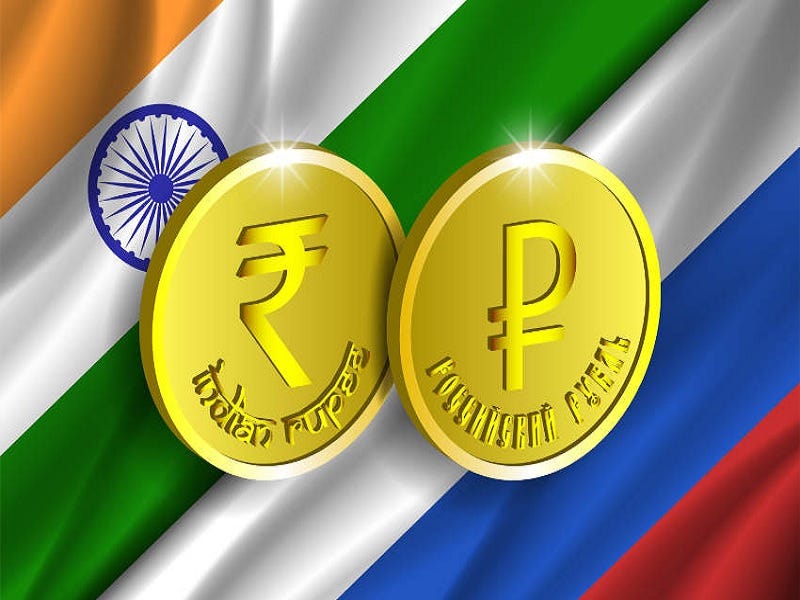The financial dimension of the Russian-Indian Strategic Partnership is qualitatively evolving as a result of the fast-moving multipolar processes that were unleashed across the world by the Ukrainian Conflict.
Russia and India are decades-long strategic partners whose contemporary relations are driven by the shared desire to accelerate tri-multipolarity processes amidst the global systemic transition, which readers can learn more about here, here, and here. This role explains the importance of their ties in today’s world, especially their financial ones, of which there are some facts but plenty of speculation. Here are three relevant reports from earlier this week that’ll then be analyzed in this piece:
* “Exclusive: Russia's Sberbank says India business booming despite Western sanctions”
* “India weighs Russia’s ‘doable’ proposal on `SWIFT’ alternative”
* “Russia built covert trade channel with India, leaks reveal”
The first revealed that Sberbank handled 70% of Russia’s $65 billion worth of trade with India last year (mostly Russian energy exports) and opened rupee accounts for Russian clients as a means of payment and savings. Its Indian staff has surged by 150% this year alone and “There are no restrictions on its operations” inside the country. Transactions only take several hours to complete, growing Indian exports solved the prior problem of Russia’s enormous rupee stockpile, and more real-sector trade is expected.
As for the second, this concerned Business Line’s report citing unnamed sources that India is seriously considering using Russia’s System for Transfer of Financial Messages (SPFS per its Russian abbreviation). That would facilitate expanding the use of national currencies in trade according to them. In their source’s own words, “Direct settlements in national currencies will not only help in de-dollarisation but also lead to cheaper, quicker and more efficient transactions.”
The third report is the most scandalous since it involves allegedly leaked documents that purport to prove that India has clandestinely become a major source of dual-use technologies for Russia that are paid for in part using digital financial assets. It’s possible that Russia reinvested some of its enormous rupee surplus into such projects, which is its right and India’s to do per their status as sovereign states. If true, then this would make India among Russia’s most important partners anywhere in the world, ever.
Reflecting on these three reports, it can be said with confidence that the financial dimension of the Russian-Indian Strategic Partnership is qualitatively evolving as a result of the fast-moving multipolar processes that were unleashed across the world by the Ukrainian Conflict. They’ve sought to make such progress for years already but hadn’t hitherto been able to do so, yet they’re now finally making up for lost time and at an astronomical pace at that, which speaks to their shared interests in this respect.
India conceptualizes its support of the Russian economy to not only be a friendly gesture that aligns with its own self-explanatory interests, but also as a means of preemptively averting Russia’s potentially disproportionate dependence on China, which the three analyses hyperlinked in the introduction elaborate upon. Russia feels the same way, plus India has reportedly proven itself to be more reliable than China with regards to dual-use technology, at least if that last report is even only partially true.
Considering the strength of Russo-Indo financial ties, including speculation that India is defying the US’ unilateral restrictions on dual-use technology exports to Russia, there’s reason to believe that Russia might make progress on negotiating a gas swap with Iran for supplying India as explained here. If that comes to pass, then those three can supercharge tri-multipolarity processes by pioneering their own pole of influence that could expand to include Afghanistan, Azerbaijan, and the Central Asian Republics.





Fakt ist das RF nicht so dumm ist, sich auf einen Partner China zu verlassen, sondern seine Kontakte bei bereits bewährten und neuen alten Partner ausbaut. Somit ist das Argument des Westens RF sei der Stiefbruder Chinas bis zu einem gewissen Grade hinfällig. Was besonders auffällt ist, die neu entfachte Zusammenarbeit mit Aserbaischan, nachdem sich Armenien, das der eigentliche Partner war abgewendet hat und sein Heil bei der EU und den USA sucht. Man wird sehen wie sich RF, der gesamte Nahe Osten und Asien entwickeln. Wenn die BRICS+, SOZ etc. es schaffen Pakistan und Indien auszusöhnen und wenn China einen Schritt in ihrer "Hegemonie" zurück machen, könnte ein Block entstehen, der jeglichen Maßnahmen des Westens ein Bollwerk entgegenstellt, dazu dann noch Afrika, wo wir erst einmal kleine Anfänge sehen und später vielleicht noch Mittel und Südamerika.
I live in Akron and am a Kent 25 indictee. I sent your posts to "old friends" of that era, and some new ones, too. Read then delete this, please.